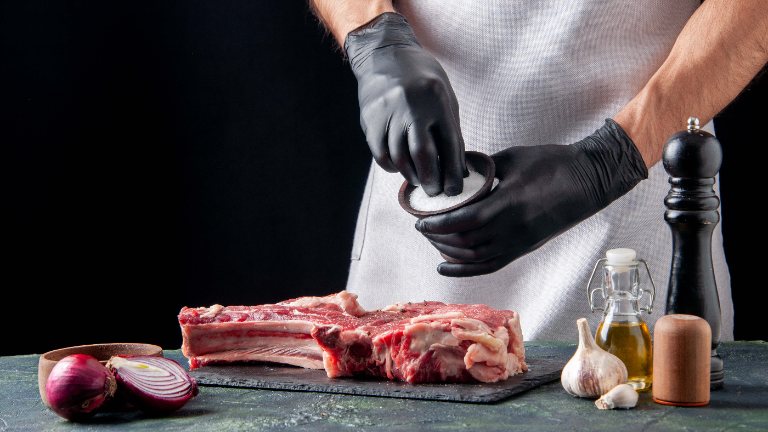Eid-Al- Adha Meat Should Not Be Over-Cooked: Do not Make These Mistakes!
For those who would like to prepare nice tables before the Feast of Sacrifice, it is of great importance to store and cook the meat correctly. Istanbul Gelisim University Faculty of Applied Sciences Head of Gastronomy and Culinary Arts Department Asst. Prof. Nevruz Berna Tatlısu made suggestions about the cooking process of the meat. Tatlısu emphasized that the conscious approach directly affects both taste and health on many issues from the resting process to the preparation of offal.
“Fresh cut meat should not be cooked immediately”
Stating that it is inconvenient to cook the meat immediately after the sacrifice is cut, Asst. Prof. Tatlısu pointed out that cooking the meat without resting will lead to both chewing difficulty and loss of flavor due to structural hardness:
“The rigor mortis process that begins in meat after cut causes muscle tissue to harden. If the meat is cooked before this process is completed, a heat-resistant structure is formed, resulting in a hard, dry, under-flavored product. The meat should be rested between 0-4° C for at least 24 hours, preferably 48 hours. During this time, natural enzymes come into play, muscles relax and meat is both cooked more easily and digested better. ”
The type of meat determines the technique
Stressing that it is a common mistake to use the same cooking method for different types of meat, Tatlısu stated that each type requires a technique suitable for its own structural characteristics:
“Veal has a structurally moderate connective tissue. Soft pieces such as steak and plywood should be grilled or sautéed at high temperature in a short time. Parts with a high rate of connective tissue, such as shin or goulash, require long-term boiling or baking at low temperature. The sous-vide method has also come to the fore in recent years, especially in beef; because thanks to the controlled temperature, water loss is reduced and cooking becomes homogeneous."
Asst. Prof. Tatlısu draws attention to the need for balanced dissolution of aroma and fat in lamb meat,
“Large pieces such as thighs and sleeves should be baked in the oven at low temperature for a long time; ribs and back should be sealed in a short time at high temperature and remain watery. In pieces with high collagen content, tandoori or slow cooking should be preferred."
Stating that a more special approach is needed for sheep meat, Tatlısu said, "Sheep meat has a high connective tissue and intense aroma. For this reason, moist and long cooking methods such as stews and stews should be applied; in addition, acidic marination should be done in advance to ensure the aroma balance."
How to cook soft and tasty meat at home?
Stating that not only the correct cooking of the meat, but also the processes applied before cooking have an effect on the result, Tatlısu stated that the marinade process will both loosen the fiber structure and increase the aroma when it is done with natural materials:
“Acidic ingredients such as yogurt, lemon, pineapple or onion juice soften the structure of the meat according to the marination period. Mixtures created with ingredients such as olive oil, thyme, black pepper also reduce water loss during cooking and provide flavor development on the outer surface."
The most suitable cooking methods for health
Stating that there are health differences between cooking methods such as ovens, cast pans, grills and pots, Tatlısu emphasized that the use of controlled temperature and appropriate time is critical:
“When baking is applied at low temperature, there is little water loss and the internal tissues cook homogeneously. The pot method, on the other hand, is ideal for parts with high collagen content, as long-term, low-temperature cooking converts collagen into gelatin, creating a mouth-disintegrating texture. Since the sealing in the cast pan distributes the high heat homogeneously, it traps the water of the meat and forms an aromatic shell on the outside. Grilling also creates strong flavor profiles in a short time; however, in case of direct fire contact, compounds that pose a health risk may be formed.
She suggested that the meat should be cooked without losing its water:
“The meat should be sealed at high temperature, not turned over frequently, and salting should be left after cooking. This both reduces fluid loss and creates an aromatic crust on the outer surface.”
Tips for cooking offal
Stating that the processing of offal such as liver, kidney and heart before cooking is critical, Istanbul Gelisim University Faculty of Applied Sciences Head of Gastronomy and Culinary Arts Department Asst. Prof. Nevruz Berna Tatlısu, warned:
"Organs such as kidneys and heart should be cleaned of membranes, nerves and blood residues; color and odor should be balanced by soaking in water. The liver, on the other hand, should not be overcooked due to its high iron content; otherwise, a metallic taste will occur. Cooking at high temperature in a short time and the acidic elements used next to it (such as lemon, vinegar) balance the aroma and facilitate digestion."
“You can balance the smell of lamb with the right techniques”
Tatlısu also made the following statement about the “lamb smell” common at the tables:
“The odor is usually concentrated in the adipose tissue. For this reason, excess oil should be extracted; marinations made with aromatic components such as olive oil, garlic, rosemary and lemon juice should be applied. When natural aromatics such as bay leaf, lavender or black pepper are used during cooking, the result is much more balanced. ”
 Created Date: : Wednesday, June 4, 2025
Created Date: : Wednesday, June 4, 2025
 Created Date: : Wednesday, June 4, 2025
Created Date: : Wednesday, June 4, 2025







